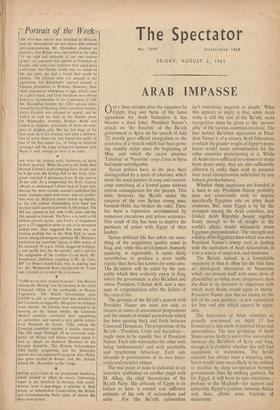— Portrait of the Week— '1111- TESI . -BAN TREATY was initialled in
Moscow, and the international air was heavy with mutual self-congratulation. Mr. Macmillan claimed on Saturday that Britain was represented at the talks 'by the right and authority of our own nuclear power', an argument that appeals to President de Gaulle, who told a less explosive than usual press conference that France would take no notice of the ban until she had a bomb that could be banned. The Chinese were not amused at the agreement, but Khrushchev seemed amused at Chinese pretensions to H-status, However, Den- mark announced willingness to sign, which came as a great relief; and Lord Hai!sham was offered honorary membership of the Committee of 100. Mr. Macmillan became the 120th witness inter- viewed by Lord Denning, while a previous witness, Lucky Gordon, was released on appeal, and we waited to read his story in the Sunday press. On ,Wednesday morning Stephen Ward was rushed to hospital, grievously ill from an over- dose of sleeping pills. But the last stage of his trial went on in his absence, and after a delibera- tion of many hours the jury found him guilty of two of the five counts (i.e., of living on immoral earnings) and the judge postponed sentence until Ward is well enough to hear it in court.
POP WENT the, opinion polls, shattering all belief in their accuracy. While the poll in the Daily Mail showed Labour's lead slumping from 18 per cent to 8 per cent, the Gallup Poll in the Daily Tele- graph reported it increasing from 18 per cent to 20 per cent. As a compromise the Daily Express offered an unchanged Labour lead of 9 per dent Among the more reliable statistics published this week, unemployment went down, and car produc- tion went up. Shipyard orders picked up slightly, as the £30 million shipbuilding loan fund was doubled and Cunard toyed with its Q4 project. The M2 was opened in full, with traffic jams, and the M6 opened in triumph. The Navy is to build a £60 million aircraft carrier, and Ford's of Dagenham gave a £75 suggestion prize to one of its seventeen sacked men. Also suggested this week are an evening parking ban in the West End, to cause havoc among theatregoers (perhaps Mr. Marples's retaliation for motorists' taking so little notice of his weekend 50 m.p.h. limit); staggered holidays; a new probe into the A6 murder; and a call for the resignation of the London Co-op head, Mr. Stonehouse. Definitely resigning is Mr, St. Clair, MP for Bristol South-East, who is making way for Mr. Wedgwood Benn (unopposed by Tories and Liberals) to re-enter the Commons.
'10,000 DiAt H ROLL FEARED IN QUAKE: Two Britons Among the Missing' was the headline in the Daily Telegraph telling of the earthquake at Skopje, Yugoslavia. The British Government gave £10,000 in aid, an amount that was criticised in the Commons as niggardly. Altogether an unhappy week abroad : the Chinese were rumoured to be massing on the Indian border, the Common Market countries continued their squabbling on agriculture, and earned a testy public rebuke from President de Gaulle. Talks among the Comecon -countries reached a similar impasse, The UN swept Portugal off its economic com- mittee for Africa, and Ghana seemed about to lead an attack on Southern Rhodesia in the General Assembly. The Maltese independence 'talks hardly progressed, and the Malaysian summit was not expected to progress. Kim Philby was given asylum in Russia, and Mr. Adoula invited Mr. Macmillan to the Congo.
BRITAIN SWELTERE.D in an unexpected heatwave, which seemed to affect its senses. Canvassing began in the Stratford by-election, with candi- datures from a pop-singer, a prisoner in Hull prison, an independent Conservative, the British and Commonwealth Party—plus, of course, the three main parties.






























 Previous page
Previous page